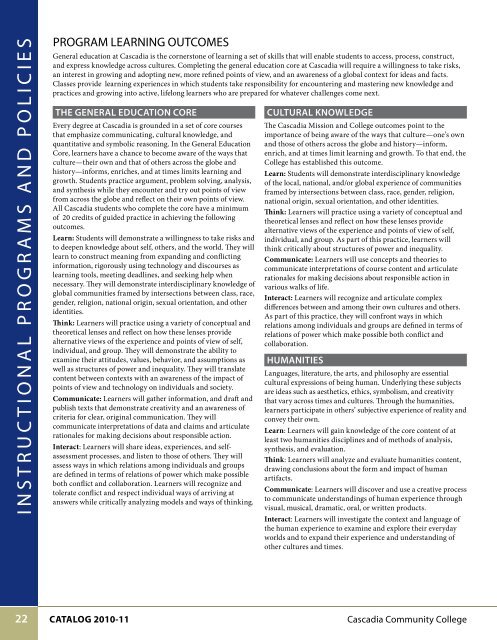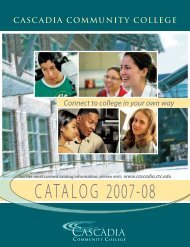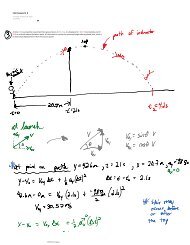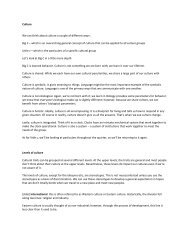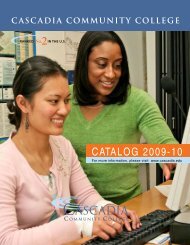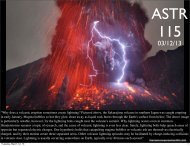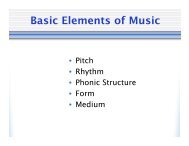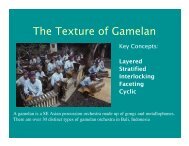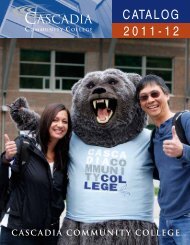CATALOG 2010-11 - Cascadia Community College
CATALOG 2010-11 - Cascadia Community College
CATALOG 2010-11 - Cascadia Community College
- No tags were found...
You also want an ePaper? Increase the reach of your titles
YUMPU automatically turns print PDFs into web optimized ePapers that Google loves.
Instructional Programs AND PoliciesProgram Learning OutcomesGeneral education at <strong>Cascadia</strong> is the cornerstone of learning a set of skills that will enable students to access, process, construct,and express knowledge across cultures. Completing the general education core at <strong>Cascadia</strong> will require a willingness to take risks,an interest in growing and adopting new, more refined points of view, and an awareness of a global context for ideas and facts.Classes provide learning experiences in which students take responsibility for encountering and mastering new knowledge andpractices and growing into active, lifelong learners who are prepared for whatever challenges come next.The General Education CoreEvery degree at <strong>Cascadia</strong> is grounded in a set of core coursesthat emphasize communicating, cultural knowledge, andquantitative and symbolic reasoning. In the General EducationCore, learners have a chance to become aware of the ways thatculture—their own and that of others across the globe andhistory—informs, enriches, and at times limits learning andgrowth. Students practice argument, problem solving, analysis,and synthesis while they encounter and try out points of viewfrom across the globe and reflect on their own points of view.All <strong>Cascadia</strong> students who complete the core have a minimumof 20 credits of guided practice in achieving the followingoutcomes.Learn: Students will demonstrate a willingness to take risks andto deepen knowledge about self, others, and the world. They willlearn to construct meaning from expanding and conflictinginformation, rigorously using technology and discourses aslearning tools, meeting deadlines, and seeking help whennecessary. They will demonstrate interdisciplinary knowledge ofglobal communities framed by intersections between class, race,gender, religion, national origin, sexual orientation, and otheridentities.Think: Learners will practice using a variety of conceptual andtheoretical lenses and reflect on how these lenses providealternative views of the experience and points of view of self,individual, and group. They will demonstrate the ability toexamine their attitudes, values, behavior, and assumptions aswell as structures of power and inequality. They will translatecontent between contexts with an awareness of the impact ofpoints of view and technology on individuals and society.Communicate: Learners will gather information, and draft andpublish texts that demonstrate creativity and an awareness ofcriteria for clear, original communication. They willcommunicate interpretations of data and claims and articulaterationales for making decisions about responsible action.Interact: Learners will share ideas, experiences, and selfassessmentprocesses, and listen to those of others. They willassess ways in which relations among individuals and groupsare defined in terms of relations of power which make possibleboth conflict and collaboration. Learners will recognize andtolerate conflict and respect individual ways of arriving atanswers while critically analyzing models and ways of thinking.Cultural KnowledgeThe <strong>Cascadia</strong> Mission and <strong>College</strong> outcomes point to theimportance of being aware of the ways that culture—one’s ownand those of others across the globe and history—inform,enrich, and at times limit learning and growth. To that end, the<strong>College</strong> has established this outcome.Learn: Students will demonstrate interdisciplinary knowledgeof the local, national, and/or global experience of communitiesframed by intersections between class, race, gender, religion,national origin, sexual orientation, and other identities.Think: Learners will practice using a variety of conceptual andtheoretical lenses and reflect on how these lenses providealternative views of the experience and points of view of self,individual, and group. As part of this practice, learners willthink critically about structures of power and inequality.Communicate: Learners will use concepts and theories tocommunicate interpretations of course content and articulaterationales for making decisions about responsible action invarious walks of life.Interact: Learners will recognize and articulate complexdifferences between and among their own cultures and others.As part of this practice, they will confront ways in whichrelations among individuals and groups are defined in terms ofrelations of power which make possible both conflict andcollaboration.HumanitiesLanguages, literature, the arts, and philosophy are essentialcultural expressions of being human. Underlying these subjectsare ideas such as aesthetics, ethics, symbolism, and creativitythat vary across times and cultures. Through the humanities,learners participate in others’ subjective experience of reality andconvey their own.Learn: Learners will gain knowledge of the core content of atleast two humanities disciplines and of methods of analysis,synthesis, and evaluation.Think: Learners will analyze and evaluate humanities content,drawing conclusions about the form and impact of humanartifacts.Communicate: Learners will discover and use a creative processto communicate understandings of human experience throughvisual, musical, dramatic, oral, or written products.Interact: Learners will investigate the context and language ofthe human experience to examine and explore their everydayworlds and to expand their experience and understanding ofother cultures and times.22 Catalog <strong>2010</strong>-<strong>11</strong> <strong>Cascadia</strong> <strong>Community</strong> <strong>College</strong>


